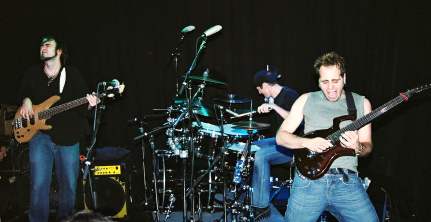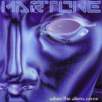Well readers, I think I could have possibly met my match over the last two months. I have been on this video kick and late last year recorded a Martone concert for future release on DVD. Sounds easy enough, right?

That is what I thought. Besides learning and playing your parts, a full production team needs to be assembled for lighting, cameras, visuals, audio FOH and the recording engineer. That still sounds easy enough.
We rehearsed for the show four days prior since all schedules involved were always busy. The playing part went great in rehearsal, and in the concert.
Where the problems started were in the lighting and audio. First I must say that two audio engineers were there for the gig. One was running FOH (front of house) and the other was recording it to a separate 24-channel system for mixing later.
I had given the FOH engineer and the lighting designer a copy of the show on CD to listen to. This was a necessity so they could understand what I was looking for instead of just guessing at the show.
We were going with a three camera visual shot but one of the camera guys fell ill; two cameras were fine, but three could have rocked a little harder.
I will list some problems that occurred in hope that you might not make the same mistakes I did. These mistakes only became apparent as I am now close to finishing the DVD.
First off, I did not have a separate meeting with just the camera people. I should have, because at many times there were endless amounts of unusable footage where we had to go to a one-camera shot. This sucks if the keyboard is playing a cool part and the camera is on my foot looking at my pedals while the other camera is staring at a light on the stage. There were quite a few problems like this were we had to do the best we could with what we had.
I should have made sure that on all solos the camera would be on the appropriate person. Three cameras would have been great in retrospect because that would have been a camera for each man. Then when we want to pull up drum visuals, we would just go to the Daniel cam, for example.
On well... live and learn on that one.
Second was the lights. This is quite critical. The lights sucked. Sorry to say, but they could have been a million times better. There were points were I was waiting in the dark to start the song. Even when I had started the lights did not come on for at least 5 seconds. This sucks if you are shooting a DVD and the cameras can't pick up the performance. I should have been more clear with the LD (Lighting Designer) that there should be always a small wash on stage just before the song starts no matter what. The only dark point should be at the end of a song.
On well... live and learn on that one.
Third was the recorded audio. This is the real clincher. Always ask the recording engineer what happens if his main system crashes as the show is going on. Imagine recording a DVD in a large concert hall and the recording system goes down. I would be sweating bullets if that happened to me. Well...guess what? It did.
I did not know until after the show when I was in the green room. The recording engineer came in with the bad news, saying that he lost half the concert since his system died. I asked what happened to his backup system. He said that there wasn't one. He also lost the audio to the encore grand finale of the concert. Basically he got about four songs on 24 tracks for me to mix. I could have died right there. It is a good thing I already had about five Heineken in me as not to freak on this guy. I waited until the end of the night to tell the bad news to the band.
This was truly a disaster and we all played our asses off on this show.
Two days later...
I get an e-mail from the recording engineer telling me how sorry he is for what has happened. In all of his years this never happened before, he said. I had to ask then, "Why me after all the years. Why me?"
He told me it was not as bad as he thought. He only lost the first three songs, and the last minute of the concert. This made me feel better, but the first three songs and the ending were my favorite tunes. Now what?
He also said there was an audio safety track which was sent to camera 1, just in case. He listened to that audio and said it sounded pretty good. The came the news that it was only one channel or a mono board mix, and the other channel was just the camera 1 condenser mike picking up the room sound. What the hell am I going to do with a mono board mix?
It was still better than nothing, I thought.
I thank God that the FOH engineer was simply awesome, and gave us a wicked mix. I could not believe how great it sounded even thought it was in mono.
Now the task at hand was to make the three mono songs and ending of the concert match with the 24 track mixed audio that I was working with at home in Brainworks studio. I had no idea what a hellish nightmare this was. I messed with the mixing of everything for about two months.
This was probably the ultimate challenge for me. Never in my life has it been so hard to work with so little to make it sound so big.
The DVD is coming along and we are in the final stages before it gets rendered. It should be available in a month and a half. You can all make your decision when you see it, but I have to say this: it is amazing how something can turn out when you allow your brain free to try anything.
May the tone be with you.
David Martone is a guitarist from Vancouver, Canada who has released seven solo CDs which showcase his musical diversity and brilliant guitarmanship.
His 2007 CD is entitled "When The Aliens Come", which features a progressive sound incorporating jazz, rock, fusion and metal influences.
